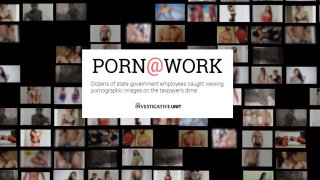
Out of 54 California agencies surveyed by the Investigative Unit, 20 percent had launched internal pornography investigations since 2015.
The official term for surfing porn at work is “computer misuse,” and it violates state policy. One Caltrans worker admitted to searching for porn on a regular basis for 15 years.
The Department of Corrections and Rehabilitation investigated 14 employees for downloading sexually explicit material on government devices.
For a complete list of NBC Bay Area’s findings, see the agency logos below. State workers viewed all of this pornography on the job – and California taxpayers are paying their salaries.
Some cases involved child pornography. A spiritual leader at the Department of Corrections and Rehabilitation was fired after managers discovered the employee used three department computers to access images of “child erotica and possible child pornography.”
An energy resource specialist at the California Energy Commission was arrested in May 2016 for attempting to perform sexual acts with a child. His arrest was part of a sting operation by the Sutter County District Attorney’s Office. Energy Commission investigators found 100 pornographic videos and images on his portable hard drive.
Local
After launching an investigation, the Department of Social Services did not substantiate an allegation that a health program manager was looking at naked women on his computer. Managers at Cal Recycle found printouts of pornographic images on a department printer, but couldn’t identify a specific employee.
In all, 10 state agencies queried by the NBC Bay Area Investigative Unit found employees accessed sexually explicit material on state computers.
In general, Americans are watching more pornography than ever. Exact figures are difficult to come by, because, as sex addiction therapist Robert Weiss puts it, “Most people don't want to talk about their sex lives - they lie.”
But Pornhub, one of the world’s leading pornography sites, tracks its annual traffic. In 2017, the site had 28.5 million visits. That’s nearly double the total of 14.7 million visits in 2013.
According to Pornhub statistics, midnight to 1 a.m. is peak time to watch porn. The work hours between 3 p.m. and 5 p.m. are a close second.
“People are watching porn between 9 and 5 because they don’t want to do it in the home setting,” Weiss said.
Aside from policy violations, Weiss finds pornography incompatible with the workplace.
“There is something wrong with a workplace that doesn’t have an IT department that is observing or carefully monitoring what employees are doing,” he said. “And it isn’t okay for employees to look at porn in the workplace.”
Caltrans recently found seven employees accessed porn on state computers. The workers were caught using internal safeguards, which include software that reports access to inappropriate websites, a department spokesman said.
A forensic analysis of employees’ computers found one man accessed inappropriate material every one of the days investigators analyzed his network and internet usage. The terms he searched for online are so graphic NBC Bay Area can’t show or even describe them.
Another employee, when questioned by department investigators, admitted to a porn addiction and said he searched for sexually explicit material at work regularly since he started with the department in 2000.
But NBC Bay Area found these weren’t the only cases of employees watching porn at Caltrans.
Program analyst Rachel Elizondo stumbled onto a secret porn exchange ring at the department in 2009. It started when her boss asked her to monitor his emails while he was gone. When she logged into his account, Elizondo saw the first in a series of emails that disturbed her.
“I clicked on it,” she said, “and from what I remember I think it was two women that were on a beach and they were laying down and there was a donkey coming behind them with the penis out.”
Elizondo reported the email to a manager right away, who asked her to click through some more sexually explicit emails.
“I’ve been raised with Biblical principles and that’s not something we look at,” Elizondo said. “You know, you get images like that in your brain and it’s hard to take them out of your brain. Once they’re there it's permanent. I just felt like it was a slap to my face.”
An internal investigation eventually uncovered that more than two-dozen Caltrans employees took part in a so-called pornography viewing ring at work.
One engineer admitted that he had been forwarding sexually explicit emails to colleagues for up to three years. Elizondo said the inappropriate content also went to state employees at other agencies.
Once co-workers caught wind that she blew the whistle, Elizondo said they began to harass her. She believes a dead rat she found hanging in her gazebo was planted by colleagues. She found her tires slashed at work. And Elizondo said someone shot a bullet into her guest bedroom. None of these incidents was ever linked to Caltrans co-workers, but Elizondo is sure she was singled out as a troublemaker. “You had some of these men coming through your cubicle, they’d make like stop sarcastic looks at you. Some of the time you could tell they were upset, kind of like it was threatening,” she said.
The intimidation got so bad Elizondo quit, and sued Caltrans. She won her lawsuit in 2017. A jury awarded her $605,000. During her trial, her attorney uncovered a multitude of pornographic images. Some Caltrans workers said they thought the photos were funny.
“I don’t think it is funny using state time, taxpayer’s money watching pornography at work,” Elizondo said.
If you have a tip for the Investigative Unit email theunit@nbcbayarea.com. Follow Liz Wagner: @Lizwags and Facebook.



